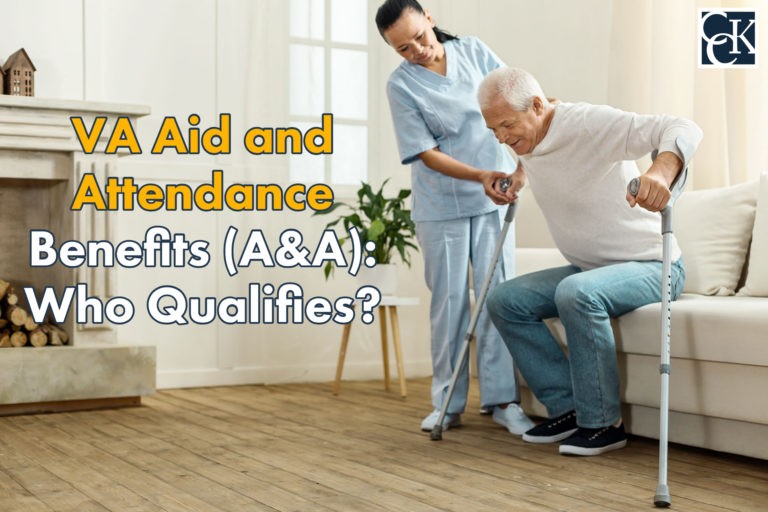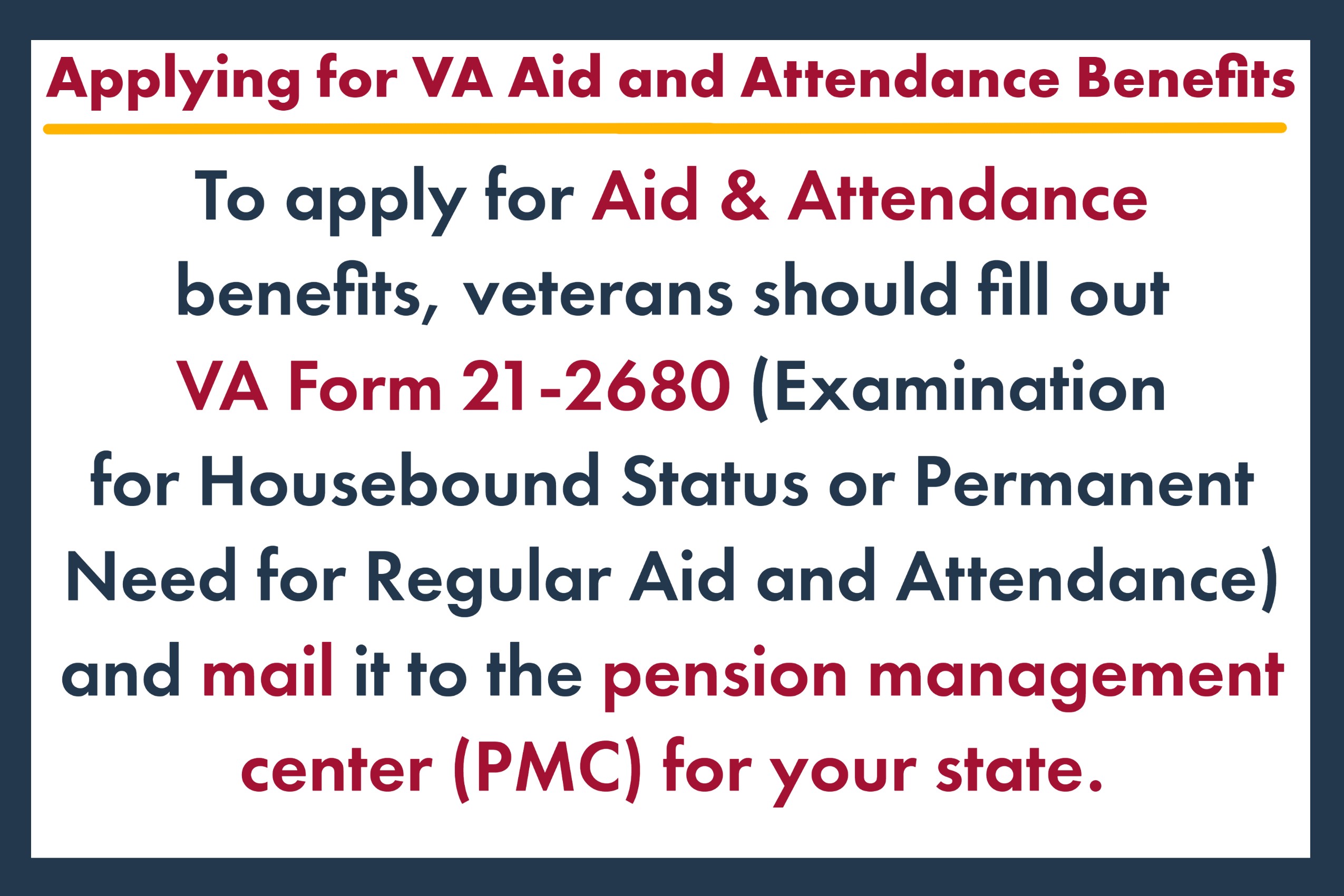VA Aid and Attendance Benefits (A&A): Who Qualifies?

What is Aid and Attendance?
Aid and Attendance (A&A) is a medical circumstance that veterans face when they require regular care from another person in order to carry out the activities of daily living. A&A benefits are paid to veterans, their dependents, or survivors at rates higher than standard VA pension or VA disability compensation.
These benefits fall under programs referred to as Enhanced Pensions and Special Monthly Compensation (SMC); however, you may not receive both an Enhanced Pension and Special Monthly Compensation, but must choose between the two.

Special Monthly Compensation (SMC) for Aid and Attendance (A&A) Benefits
Special Monthly Compensation (SMC) for aid and attendance is a monthly, tax-free benefit paid to veterans instead of standard disability compensation. SMC is paid to veterans (or spouses and survivors) suffering from especially serious disabilities related to their time in service.
In order to qualify for aid and attendance benefits in the form of Special Monthly Compensation (SMC), a veteran must require the assistance or supervision of another person to do activities of daily living such as, but not limited to:
- Getting dressed;
- Bathing and maintaining personal hygiene;
- Preparing meals and eating;
- Using the restroom;
- Adjusting prosthetic or orthopedic appliances that most others would usually be able to manage alone.
Other criteria that qualify a veteran to receive A&A benefits include:
- If the veteran’s mental disability requires the regular care of another person in order to protect them from hazards in their daily environment;
OR
- If the veteran is “bedridden,” meaning that their medical condition is so severe that it requires them to remain in bed. This does not apply to a temporary, prescribed period of bedrest.
One does not have to meet all the criteria listed above in order to qualify for Special Monthly Compensation based on the need for aid and attendance.
There are various “levels” of SMC used to clearly define the additional compensation to which a veteran is entitled based on their service-connected medical condition(s). The SMC level for veterans requiring regular A&A is SMC(r); this level of SMC is split into SMC(r1) and SMC(r2).
- SMC (r1)—This level is given if the veteran’s aid and attendance can be performed by a non-medical professional, such as a family member.
- SMC(r2) — SMC(r2) is given if the A&A required must be performed by a licensed medical professional, or by someone working on behalf of a licensed medical professional. To qualify, VA must determine that the veteran would otherwise have to be hospitalized, placed in a nursing home, or otherwise institutionalized if they did not have access to in-home care.
Housebound benefits are provided under level SMC(s). If a veteran is considered permanently housebound, it means that they are expected to be unable to leave their home indefinitely due to a service-connected disability.
Veterans may also qualify for housebound benefits if they have one service-connected disability rated at 100 percent in addition to a disability from a different bodily system rated at 60 percent disabling. This second disability must also be service-connected. You may not receive SMC(r) and SMC(s) simultaneously. Monthly rates for these levels of SMC can be found here.
Do I Qualify for Aid and Attendance Based on My Service And Income?
In order to determine if you qualify for an Enhanced Pension based on the need for regular aid and attendance, it is important to first understand what a standard VA pension is, and the criteria you must meet in order to receive it.
VA pension is a needs-based, monthly, tax-free benefit paid to low-income veterans facing financial challenges. In order to qualify for a VA pension, a veteran must have been discharged under conditions other than dishonorable.
Additionally, veterans must meet the following criteria:
- Veterans must have started active duty prior to September 7, 1980, must have served for at least 90 days while on active duty, with at least one day during a wartime period; OR
- Veterans must have entered active duty after September 7, 1980, and served for “at least 24 months or the full period for which you were called or ordered active duty, with at least one day during a wartime period.”
Veterans must also have a countable income below the Maximum Annual Pension Rate (MAPR), the yearly income limit set by law to receive a VA pension.
In addition to the service-related qualifications listed above, a veteran must also meet one of the below criteria:
- Age 65+; OR
- Permanently and Totally (P&T) disabled due to any condition (does not have to be service-connected); OR
- In a nursing home receiving professional care; OR
- Receiving Social Security Disability Insurance (SSDI) or Supplemental Security Income (SSI).
Do I Qualify for Aid and Attendance Based on My Need for Regular Assistance to Complete Activities of Daily Living?
To qualify for aid and attendance benefits in the form of SMC, a veteran must require the assistance or supervision of another person to do activities of daily living.
Veterans are eligible to receive an enhanced VA pension if:
- Assistance is required from another person in order to perform daily activities such as: using the restroom, bathing oneself, eating, getting dressed, adjusting prosthetic appliances, and protecting themselves from hazards in their daily environment; OR
- They are bedridden, meaning their disability requires them to remain in bed. This does not apply for periods of bed rest prescribed by a medical professional; OR
- The veteran is a patient in a nursing home because of a “mental or physical incapacity;” OR
- Their corrected (with glasses or contacts) visual acuity for both eyes is 5/200 or less, or “concentric contraction of the visual field to five degrees or less.”
Increased monthly pensions are also available to veterans who are deemed to be housebound, or confined to their home, due to a permanent disability.
How to Apply for Aid and Attendance Benefits: VA Form 21-2680
To apply for Aid & Attendance benefits, veterans should fill out VA Form 21-2680 (Examination for Housebound Status or Permanent Need for Regular Aid and Attendance) and mail it to the pension management center (PMC) for your state.
You can have your doctor fill out the examination information section.
With your Form 21-2680 you can also include other information, such as:
- Additional evidence, like a doctor’s report, that shows you need Aid and Attendance
- Details about what you normally do during the day and how you get to places
- Details that help show how your illness, injury, or mental or physical disability affects your ability to do things, like take a bath, on your own
Getting Assistance with VA Claims
Even though many veterans require aid and attendance, VA can often deny these claims. However, if your claim for aid and attendance was denied, it does not mean your case is not winnable.
The VA disability lawyers at Chisholm, Chisholm & Kilpatrick may be able to help with your appeal for aid and attendance. For a free case evaluation, call our office at 800-944-5144.
About the Author
Share this Post


